The Chinese government has undertaken a vast information influence campaign designed to support its favored candidates and sow distrust in Taiwan’s democracy, notes Director of the Brookings Institution’s China Strategy Initiative and the author of a forthcoming report on China’s global information influence operations.
China’s efforts go far beyond spreading disinformation and stale state propaganda. Beijing’s ambition is to shape the production, dissemination, and consumption of information in Taiwan. And as my colleagues and I argue in a forthcoming Brookings report, these efforts foreshadow a sophisticated strategy to influence every stage of the global information supply chain, from the people who produce content to the institutions that publish it and the platforms that deliver it directly to consumers, he writes for Foreign Affairs:
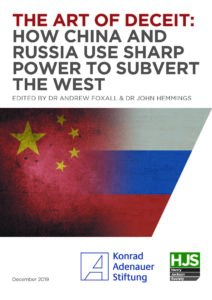 Beijing uses a range of positive and negative inducements. Each year, it hosts several all-expenses-paid media conferences and exchanges with Taiwanese journalists, building ties with reporters and their institutions in the process. Within Taiwan, those who write critically about China, particularly about its influence in Taiwanese media and politics, find themselves on the receiving end of an intense campaign of intimidation. Prominent investigative reporters and scholars report a deluge of public attacks, harassment, and even personal threats. Exploiting Taiwan’s low legal threshold for libel, entities with close ties to the mainland have filed a number of lawsuits against critical journalists, including reporters at Western publications such as the Financial Times.
Beijing uses a range of positive and negative inducements. Each year, it hosts several all-expenses-paid media conferences and exchanges with Taiwanese journalists, building ties with reporters and their institutions in the process. Within Taiwan, those who write critically about China, particularly about its influence in Taiwanese media and politics, find themselves on the receiving end of an intense campaign of intimidation. Prominent investigative reporters and scholars report a deluge of public attacks, harassment, and even personal threats. Exploiting Taiwan’s low legal threshold for libel, entities with close ties to the mainland have filed a number of lawsuits against critical journalists, including reporters at Western publications such as the Financial Times.
China and Russia employ similar “active measures” to undermine the West, according to a recent report from the Henry Jackson Society and Konrad Adenauer Stiftung (above).
Democracies around the world should pay close attention to what happens in Taiwan’s election—for their own journalists, media companies, and platforms are fast becoming the focus of similar efforts by Beijing, cautions. RTWT
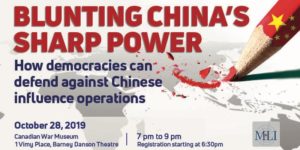 This is more a struggle to perpetuate authoritarian rule in China than an ideological campaign like that of the cold war and it is primarily being waged on Chinese soil. But the fight is increasingly being exported, too, as Beijing strives to make the world safe for Chinese autocracy. The goal is to impose as heavy a price as possible on anyone, anywhere who opposes the party’s power or objectives. Western liberal democracies are the main targets, The FT’s Jamil Anderlini adds:
This is more a struggle to perpetuate authoritarian rule in China than an ideological campaign like that of the cold war and it is primarily being waged on Chinese soil. But the fight is increasingly being exported, too, as Beijing strives to make the world safe for Chinese autocracy. The goal is to impose as heavy a price as possible on anyone, anywhere who opposes the party’s power or objectives. Western liberal democracies are the main targets, The FT’s Jamil Anderlini adds:
Ignoring China’s bullying behavior would be an egregious form of racism towards ethnically Chinese compatriots since they are the primary targets of Beijing’s intimidation and overseas influence operations. It would also be foolish. As the recently retired head of Australia’s main spy agency said in November, the Communist party has been very skillful at exploiting the openness of western democratic systems. The “effects might not present for decades and by that time it’s too late”, he said. “You wake up one day and find decisions made in our country that are not in the interests of our country.”
“Rising authoritarianism in China is one of the most important challenges of the 21st century,” said the commission, which is led by Rep. Jim McGovern (D-Mass.) and Sen. Marco Rubio (R-Fla.).
China has driven investment to new places, such as Cambodia. Yet that growth has also brought risks for Beijing, analyst Chris Horton writes for The Atlantic in The Costs of China’s Belt and Road Expansion.
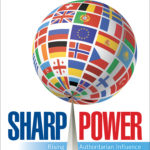 Some in the West and in Asia believe that China seeks economic and geopolitical leverage over its developing country partners. U.S. officials are concerned about what they see as China’s predatory lending in Latin America, Africa, and Asia. And in many developing countries, civic activists, government officials, and researchers worry about the financial, environmental, social, and political sustainability of many China-led commercial projects, argues Matt Ferchen, head of program, International Relations at the Mercator Institute for China Studies.
Some in the West and in Asia believe that China seeks economic and geopolitical leverage over its developing country partners. U.S. officials are concerned about what they see as China’s predatory lending in Latin America, Africa, and Asia. And in many developing countries, civic activists, government officials, and researchers worry about the financial, environmental, social, and political sustainability of many China-led commercial projects, argues Matt Ferchen, head of program, International Relations at the Mercator Institute for China Studies.
“The big question is, who is learning what from these processes? Host countries, China, the United States, and other stakeholders with an interest in these issues need to share lessons learned and best practices,” he adds. “And governments, businesses, civil society organizations, and researchers in different parts of the world that are engaged with China’s international development ambitions should all be talking more with one another.”
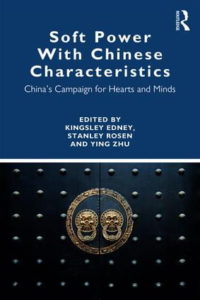 The Chinese Communist Party’s attempts to improve China’s image around the world is the focus of a new book, Soft Power With Chinese Characteristics: China’s Campaign for Hearts and Minds, edited by Kingsley Edney, Stanley Rosen, and Ying Zhu. This attractive form of power is crucial if China is to avoid provoking an international backlash against its growing military and economic might, the authors suggest.
The Chinese Communist Party’s attempts to improve China’s image around the world is the focus of a new book, Soft Power With Chinese Characteristics: China’s Campaign for Hearts and Minds, edited by Kingsley Edney, Stanley Rosen, and Ying Zhu. This attractive form of power is crucial if China is to avoid provoking an international backlash against its growing military and economic might, the authors suggest.
Taiwan’s population is preparing to vote in national presidential and legislative elections on Saturday, National Endowment for Democracy partner China Digital Times adds:
At The New York Times, Steven Lee Myers and Chris Horton report on how Chinese aggression has significantly bolstered the chances of incumbent President Tsai Ing-wen by turning the election into a public referendum on democracy and Taiwanese self-governance. One year ago, President Tsai’s popularity had fallen drastically, clearly represented in her Democratic Progressive Party’s losses in local elections and her subsequent resignation as party leader. Since then, her favorability has been on a steady rise, aided at least in part by Beijing’s belligerence toward the island nation and approach to the Hong Kong pro-democracy movement’s ongoing protest against Chinese encroachment in the region.
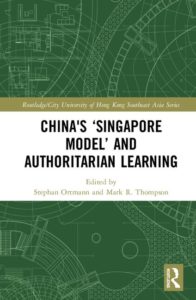 In the eyes of China’s neo-authoritarian reformers, Singapore, despite being a tiny city-state, long exemplified a state of affairs for which the PRC should strive: resilient authoritarianism alongside but unweakened by liberalizing steps conducive to economic growth, argues Mark Thompson, of the City University of Hong Kong, and author of China’s “Singapore Model” and Authoritarian Learning, ed. with Stephan Ortmann (forthcoming 2020) and Authoritarian Modernism in East Asia.
In the eyes of China’s neo-authoritarian reformers, Singapore, despite being a tiny city-state, long exemplified a state of affairs for which the PRC should strive: resilient authoritarianism alongside but unweakened by liberalizing steps conducive to economic growth, argues Mark Thompson, of the City University of Hong Kong, and author of China’s “Singapore Model” and Authoritarian Learning, ed. with Stephan Ortmann (forthcoming 2020) and Authoritarian Modernism in East Asia.
Today, however, Xi Jiinping has derided foreign templates and relegated adopting the “Singapore model” to a path not taken by China’s current hard-line leadership and unavailable for authoritarian reformers to pursue, he will tell a Stanford seminar on The Decline of the “Singapore Model” and the Fate of Authoritarian Reformism in China:
Efforts to model reforms on the Singaporean “state-party” ran into the prerogatives of the Chinese party-state. Proposals to strengthen market forces, impose limited legal constraints on the party, and introduce semi-competitive elections were seen as threatening the institutional foundations of the CPC. Moreover, despite a (partial) revival of Confucianism in China that imitated the city-state’s attraction to “Asian values,” Singapore’s neo-liberal “pragmatism” and multi-racialism contradicted the CPC’s self-portrayal as an engine of Marxist socialism embodying the Han-Chinese nation.

 The
The 





